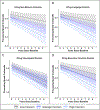Predicting brain atrophy and cognitive aging trajectories with baseline subjective cognitive concerns in cognitively normal older adults
- PMID: 39205367
- PMCID: PMC12091246
- DOI: 10.1016/j.neurobiolaging.2024.08.006
Predicting brain atrophy and cognitive aging trajectories with baseline subjective cognitive concerns in cognitively normal older adults
Abstract
Subjective cognitive concerns (SCC) are common even in cognitively normal older adults who lack objectively-detectable deficits on standard neuropsychological evaluation. The clinical relevance of these concerns, particularly considering the nature of concerns (e.g., memory versus non-memory), remains unclear. Thus, we examined whether baseline memory and non-memory SCC relate to longitudinal change in brain volume and neuropsychological test performance in 476 functionally-intact, objectively unimpaired older adults (Mage = 72y, 56 % female, follow-up time = 1 - 9 years). Mixed-effects models revealed that both higher baseline memory and non-memory SCC predicted greater atrophy in total gray matter and dorsolateral prefrontal cortex atrophy over time, while only memory SCC predicted steeper medial temporal lobe atrophy. Regarding neuropsychological performance, higher non-memory SCC predicted decline in processing speed performance, while memory SCC did not predict neuropsychological trajectories. SCC are a risk factor for more adverse brain and cognitive aging trajectories, even in functionally-intact, seemingly cognitively normal older adults.
Keywords: Atrophy; Early detection; Healthy aging; Neuropsychological performance; Subjective cognitive concerns.
Copyright © 2024 Elsevier Inc. All rights reserved.
Conflict of interest statement
Disclosure Statement: Authors have no conflicts to disclose.
Figures


References
-
- Asken BM, Vandevrede L, Rojas JC, Fonseca C, Staffaroni AM, Elahi FM, Lindbergh CA, Apple AC, You M, Weiner-Light S, Brathaban N, Fernandes N, Boxer AL, Miller BL, Rosen HJ, Kramer JH, Casaletto KB, 2022. Lower White Matter Volume and Worse Executive Functioning Reflected in Higher Levels of Plasma GFAP among Older Adults with and Without Cognitive Impairment. Journal of the International Neuropsychological Society 28(6). 10.1017/S1355617721000813 - DOI - PMC - PubMed
-
- Bates D, Mächler M, Bolker BM, Walker SC, 2015. Fitting linear mixed-effects models using lme4. Journal of Statistical Software 67(1). 10.18637/jss.v067.i01 - DOI
-
- Casaletto KB, Elahi FM, Staffaroni AM, Walters S, Contreras WR, Wolf A, Dubal D, Miller B, Yaffe K, Kramer JH, 2019. Cognitive aging is not created equally: differentiating unique cognitive phenotypes in “normal” adults. Neurobiology of aging 77, 13–19. 10.1016/j.neurobiolaging.2019.01.007 - DOI - PMC - PubMed
Publication types
MeSH terms
Grants and funding
LinkOut - more resources
Full Text Sources
Medical
Research Materials

